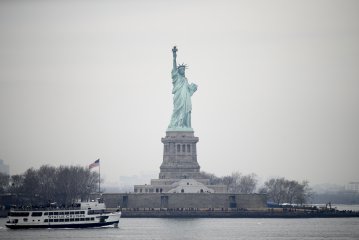by Xinhua writers Yang Shilong, Chang Yuan
NEW YORK, June 4 (Xinhua) -- For 23-year-old Chung-ling Lee, a Chinese graduate with a Master's degree in Finance at the Massachusetts Institute of Technology (MIT), it was no surprise that China's Ministry of Education issued an official warning to U.S.-bound Chinese students about potential risks they may encounter.
The ministry said the visa applications of some Chinese hoping to study in the United States have recently been restricted, with an extended review process, shortened validity period, and an increased rejection rate, which has affected their plans to study in the United States or the completion of their studies there.
DISRUPTIVE RESTRICTIONS
"It (visa restriction) has been going on for quite a while. Many of my classmates and friends have encountered prolonged review time. It's kind of helpless, tiring long wait," Lee told Xinhua Tuesday.
Among the 10,313 people supported by the Chinese government scholarships in 2018 to study in the United States, 3.2 percent had their trips cancelled due to visa issues, showed statistics from the China Scholarship Council.
In the first three months of 2019, however, that ratio soared to 13.5 percent.
It is "particularly troublesome" for Chinese graduate students in certain STEM (science, technology, engineering and mathematics) fields as the U.S. State Department shortened their length of visa from fives years to one year in 2018, Lee said.
"These students have to go back to China and stay for at least a month to get their F1 visas renewed ... It's really disruptive to their studies," said Lee, who was accompanying her parents visiting the Big Apple after the graduation ceremony.
Previously, the U.S. visa checks apply to mainly a few defense-related areas, now they "even apply to pure mathematics," said Lee, who just accepted a job offer in Beijing. "It's definitely getting tougher and tougher."
More Chinese graduates like Lee prefer to return to China for work after graduation.
Lee said her friend, a PhD student who studies theoretical mathematics, was once questioned for over an hour by immigration officials before entering the United States.
"Such an incident ... has a very negative psychological impact on my friend," Lee said. "It's not the United States we were taught in class here."
A Columbia University student surnamed Ting also has similar stories to share.
"I got the visa five years ago without any distress. But now many of my classmates felt the pinch from the visa squeeze," said the 24-year-old PhD in applied mathematics.
Ting's roommate, an optical physics student, is hesitating about going back to China for holidays. He could miss two to three months of school if his visa application is caught up in lengthy delays, which he has experienced before.
"The university does not allow him to miss school for so long after all," said Ting.
DAMAGING IMPACT
"Dangerous policies and anti-immigrant rhetoric" have created a "chilling effect" on enrollment, as the United States is "increasingly viewed as unwelcoming" to international students and scholars, according to a report recently released by NAFSA: Association of International Educators, a non-profit organization for professionals in all areas of international education.
The report estimated the combined 10-percent decline of new international student enrollment between fall of 2016 and fall of 2017 cost the U.S. economy 5.5 billion U.S. dollars and more than 40,000 jobs.
Recent figures also showed that the 1,094,792 international students studying at U.S. colleges and universities contributed 39 billion dollars and supported more than 455,000 jobs during the 2017-2018 academic year.
"Openness -- a key to the extraordinary success of America's great research universities -- must remain a hallmark of Yale," said Peter Salovey, president of Yale University, late last month in a letter affirming the Ivy League school's "steadfast commitment" to international students and scholars.
"We appreciate the expertise, creativity, and dedication they bring to our shared pursuit of knowledge and truth, and we affirm their belonging as members of the Yale community," Salovey said.
Mary Sue Coleman, president of the Association of American Universities, said the United States has long been able to recruit the best and brightest from all over the world. The notion that the country is unwelcoming could be damaging, she said.
More than 363,300 Chinese students were registered in U.S. colleges and universities for the 2017-2018 school year, making up 33.2 percent of the international students, according to the 2018 Open Doors report of the U.S.-based Institute of International Education.
"The U.S. scholars I met actually oppose the government's discriminatory policies, they appreciate the great contributions done by Chinese scholars and students to the scientific research, and are sympathetic to the unfair treatment they have suffered here in recent years, " said Gu, also a PhD at the MIT. "Keep politics away from science and scientific exchanges, that's what all of us value and advocate."






















Latest comments